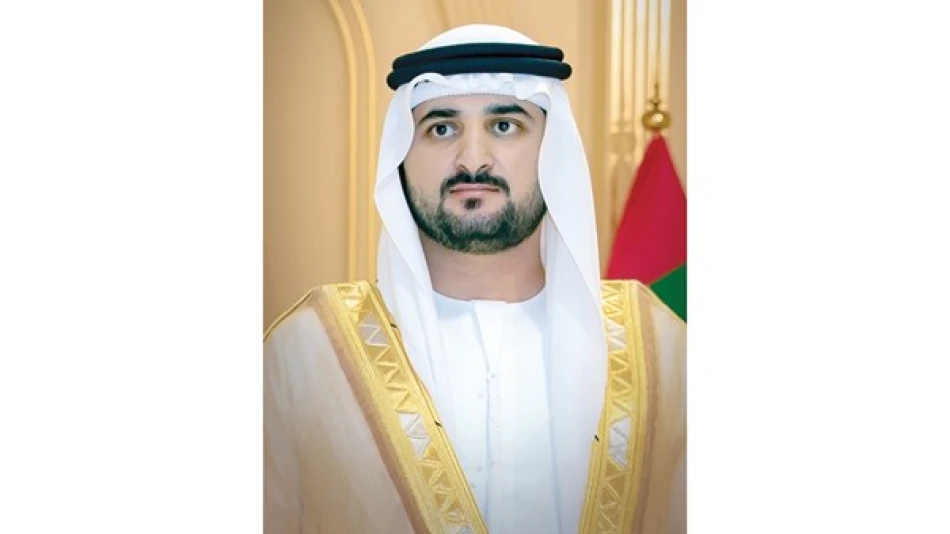
Dubai's Strategic Financial Roadmap: 2027-2029 Budget Cycle Empowers Public Finance Transformation
UAE Launches AI-Powered Budget Revolution to Fuel 2071 Vision
The UAE Ministry of Finance has unveiled its 2027-2029 federal budget cycle, marking a transformative shift from traditional annual planning to an AI-driven strategic financial framework. This move positions the Emirates at the forefront of digital government finance, leveraging artificial intelligence and predictive analytics to optimize resource allocation and accelerate the nation's ambitious 2071 centennial goals.
From Bureaucracy to Digital Efficiency
The ministry has achieved remarkable operational improvements that signal a broader transformation in government efficiency. Budget preparation steps have been slashed from 50 to just 10, while government procurement cycles have been compressed from 60 days to under 6 minutes. These aren't merely administrative improvements—they represent a fundamental reimagining of how modern governments can operate in the digital age.
Sheikh Maktoum bin Mohammed bin Rashid Al Maktoum, Deputy Prime Minister and Minister of Finance, emphasized that this budget cycle transforms the ministry from a supervisory body into an enabling force. This shift reflects a growing global trend where finance ministries are becoming strategic partners rather than gatekeepers.
Strategic Investment Priorities
Human Capital Focus
The 2027-2029 budget prioritizes sectors directly impacting citizens and residents: education, healthcare, social benefits, and essential government services. This human-centric approach aligns with global best practices seen in Singapore and Nordic countries, where long-term prosperity depends on sustained investment in people.
Digital Infrastructure as Economic Driver
The integration of AI and advanced analytics into budget planning represents more than technological modernization—it's a competitive advantage. By using predictive scenarios and real-time data analysis, the UAE can respond to economic shifts faster than traditional budget cycles allow, potentially giving it an edge during global economic volatility.
Financial Strength Underpins Ambition
The UAE's financial foundation supports this ambitious digital transformation. With federal government assets reaching AED 464.4 billion by end-2024 and local public debt maintained at a modest AED 62.1 billion as of June 2025, the Emirates enjoys fiscal flexibility that many developed nations lack.
Over four previous strategic budget cycles, the UAE allocated approximately AED 900 billion, demonstrating sustained commitment to long-term development. This financial discipline provides the stability necessary for the kind of transformative planning now being implemented.
Global Implications for Government Finance
The UAE's approach offers a blueprint for other nations grappling with traditional budget constraints. By transforming budgets from resource allocation tools into strategic enablers, governments can potentially achieve better outcomes with existing resources.
This model particularly resonates as global economic uncertainty demands more agile fiscal responses. Traditional annual budget cycles, still used by most governments, may prove inadequate for addressing rapid technological and economic changes.
Market and Investment Perspective
For international investors and businesses, the UAE's budget innovation signals several opportunities. The emphasis on digital transformation and AI integration suggests growing demand for technology solutions and consulting services. The streamlined procurement processes could attract more international suppliers seeking efficient government contracts.
The focus on education and healthcare investment also indicates potential growth in these sectors, particularly for companies offering innovative solutions aligned with the UAE's digital-first approach.
Looking Beyond 2029
This budget cycle serves as a stepping stone toward the UAE's 2071 centennial vision, which aims to position the country as a global leader across multiple sectors. The integration of AI into fundamental government operations suggests the UAE is building institutional capabilities that will compound over time.
The success of this approach could influence other Gulf states and emerging economies to adopt similar digital-first budget methodologies, potentially reshaping how governments worldwide approach fiscal planning and resource allocation.
Most Viewed News

 Layla Al Mansoori
Layla Al Mansoori






